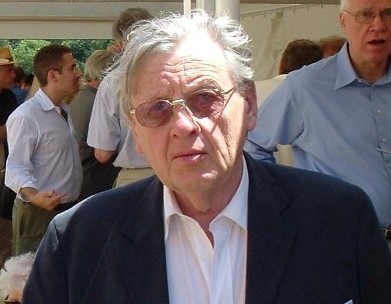Colin Campbell (1931-2022)
Colin Campbell, the petroleum geologist who coined the term “peak oil,” has died. He was a co-founder of the Association for the Study of Peak Oil (ASPO) in 2000 and the author of many articles and books on petroleum geology and oil depletion.
Colin grew up in Cornwall in the southwest of Britain, his father a visionary architect who dreamed of creating a model village. Campbell earned his PhD in 1957, based on field work in Borneo. Shell hired him as an exploration geologist, but he soon moved to Texaco and began studying rocks in South America. In 1966, tasked with writing up a detailed review of Colombia’s petroleum geology, including past production and future prospects, Campbell had his first insights into resource limits.
These insights gradually coalesced into the landmark article, co-authored with Jean Laherrère, “The End of Cheap Oil,” published in the March, 1998 issue of Scientific American. The article was hugely influential. While the science of oil depletion had been explored by M. King Hubbert in the 1950s, the Campbell-Laherrère piece sparked new and widespread interest in the otherwise largely ignored fact that fossil fuels are finite resources that humanity is depleting over a remarkably a short time frame. Campbell and Laherrère were, in effect, saying to the world, “Hey, the stuff that makes our economy go will be harder to get in just a few years. What’s our plan?” So far, the world has had no good reply.
Campbell’s own plan was an “oil depletion protocol”—effectively, a global petroleum rationing system. According to its terms, the world’s oil-producing nations would agree to scale back annual extraction rates by their rates of depletion, thereby preserving the resource for future generations.
I owe Colin an immense personal debt. My books The Party’s Over (2003) and The Oil Depletion Protocol (2006) were based directly on his work, and he generously offered comments, corrections, and suggestions as these books were being written and edited.
Campbell expected a global peak in oil production to occur around 2007. Instead, while conventional oil extraction rates did stop growing then, fracking brought one last spurt of supply growth from unconventional “light, tight oil.” As of 2022, production growth from unconventional resources is straining to overcome accelerating declines in conventional crude output.
Beyond being an exceptional scientist and talented communicator, Colin was a delightful human being. He had a kind disposition and a sparkling sense of humor. He was an entertaining raconteur about his former days in the oil industry, when he spent months at a time prospecting with a burro in South America. My wife Janet and I both fondly recall a visit with Colin and Bobbins Campbell at their home in Ballydehob, Ireland. When driving us briskly down dangerously narrow, twisty roads at the west end of County Cork, Colin smilingly reassured us, “Don’t worry, I’m a geologist.”
Colin enjoyed a daily pint of Murphy’s Irish Stout, and explained peak oil to the uninitiated thusly: “It’s quite a simple theory and one that any beer drinker understands. The glass starts full and ends empty and the faster you drink it the quicker it’s gone.”
Campbell had a philosophical outlook on humanity and its future. He didn’t expect a miraculous transition away from fossil fuels toward alternative energy sources. Instead, he believed we would endure a painful but instructive return to a lower-energy way of life.
Thank you, Colin, for your insights, your good humor, and your wisdom.
Photo: Colin Campbell 2006 San Rossore Italy. By Trotalli via Wikimedia Commons https://commons.wikimedia.org/wiki/File:Colin_Campbell_Geologo_Petrolifero.jpg






